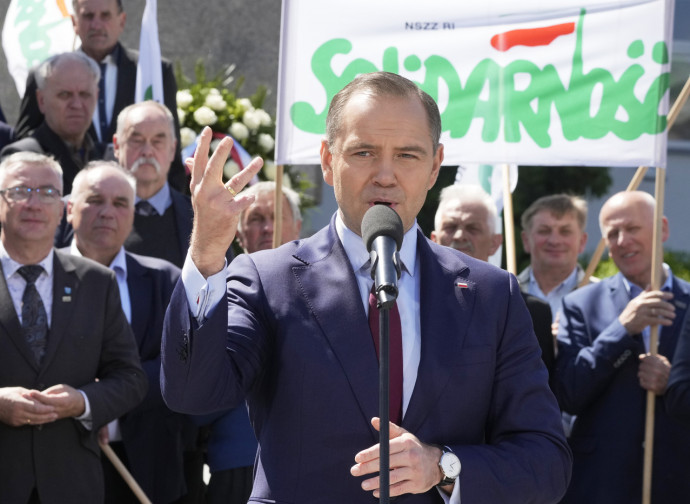Poland fears a Franco-German dictatorship in Europe
France and Germany are moving closer to an “ever closer union” in Europe. This is at the expense of smaller nations eager for independence. In Poland, Nawrocki's election is a response to this trend.

Chancellor Friedrich Merz and French President Emmanuel Macron are seeking a new beginning in their relations; a “reset” is under discussion in Berlin and Paris. The governments want to come up with concrete initiatives by the end of the summer, and consultations between the respective ministers have already begun. “Close Franco-German coordination” should contribute to a “more sovereign Europe,” Merz and Macron wrote in a joint article in May.
The German newspaper Handelsblatt has revealed the internal agenda for the Franco-German “reset.” The guiding principle of the four-page government document is to reduce dependence on foreign powers, and this applies first and foremost to Donald Trump's America. The document stresses that Europe must prepare for a “withdrawal of the United States from European security.” It is therefore necessary to be able to act independently.
But the victory of Eurosceptic Karol Nawrocki in the Polish presidential elections represents a setback for Chancellor Friedrich Merz's efforts to create a ‘more sovereign Europe’, detached from the United States, governed by the Berlin-Paris axis with the sovereignty of individual states reduced or eliminated.
The debate on this issue has resumed since the beginning of Donald Trump's presidency and due to growing tensions in the Indo-Pacific. According to the document cited by Handelsblatt, the European Union should strive for greater independence in several areas: the development of the arms industry, artificial intelligence, and security policy. All this should be coordinated within the framework of close cooperation between Germany and France, which would be the driving force behind the new balance of power. The ministries of both countries will announce joint initiatives this year in the form of mergers of companies that could compete with the US and China.
The text also emphasizes the role of Poland, and in particular of President-elect Karol Nawrocki, who could become the main opponent of such changes in Europe. His election victory is seen as a kind of defeat for the plans of Friedrich Merz, who visited Paris and Warsaw in May, outlining his vision for a new format of cooperation.
It is worth remembering that with the establishment of the new government in Berlin, an improvement in relations with Poland was announced. The German media wrote that the current “pro-European” government in Warsaw would be more open to cooperation with the new Chancellor.
After the second round of the presidential elections in Poland, the situation changed dramatically. Immediately after the announcement of the official results, the German media was flooded with information about the defeat of Prime Minister Donald Tusk and Rafał Trzaskowski, and about the fact that building greater European integration would be significantly more difficult. This was also due to the pro-American stance of Karol Nawrocki and the Law and Justice party, which could return to power: “The victory of Eurosceptic Karol Nawrocki in the Polish presidential election is a defeat for German Chancellor Friedrich Merz's efforts to strengthen European cohesion,” wrote Handelsblatt.
This explains why Nawrocki's victory in the Polish presidential election caused so much anger in Germany. This anger was also evident in the Polish-language German media, which had been rooting for Trzaskowski from the start.
The responses to the congratulations on the victory of the president-elect are also significant in terms of international relations. Karol Nawrocki first thanked US President Donald Trump, Italian Prime Minister Giorgia Meloni, and Hungarian Prime Minister Viktor Orbán.
“Thank you, Mr. President. A strong alliance with the United States, as well as a partnership based on close cooperation, are my priorities,” Nawrocki wrote on X, addressing Trump.
Only later did Nawrocki respond to Chancellor Merz's message: "I appreciate your kind message, Chancellor. I deeply believe that Europe can face these challenges and build prosperity, provided that it acts as a team of players who remember history, value heritage, and respect the integrity of others. Such a Europe is worth building." Nawrocki wants a Europe of equal states that respects the history, values, and sovereignty of its member countries.
It is no secret that many representatives of the liberal and center-left elites in Europe, promoters of progressive values, have criticized Donald Trump's presidency. For this reason, the White House has forged stronger ties with center-right, conservative, and sovereigntist parties. During the presidential campaign, Karol Nawrocki strongly supported a strong Polish-American alliance, which was particularly evident during his visit to the White House and his meeting with Donald Trump.
It should be noted that, unlike Nawrocki, Polish Prime Minister Tusk is seeking to weaken relations with Trump's America in order to gain credibility with the oligarchies in Brussels and the leaders in Berlin and Paris. For this reason, among other things, he has decided to review plans for cooperation with the US and South Korea in the military and nuclear energy fields, even to the detriment of Poland's economic interests.
An example of this action is the cancellation of the tender for 32 Black Hawk helicopters, which were to be built in a Polish factory in Mielec. This is a slap in the face for the US, Polish industry, and the Polish army. Clearly, Tusk is more concerned with following the instructions of Brussels, which wants military equipment orders to be placed within the European Union, than with Poland's interests. Unfortunately, the PZL Mielec plant, which employs 1,600 people, although an excellent facility, is owned by the American company Lockheed Martin. Even though they produce high-quality helicopters that have been tested in Poland, the government does not buy them. This is Tusk's “pro-European” policy that appeals to the oligarchies in Brussels.
